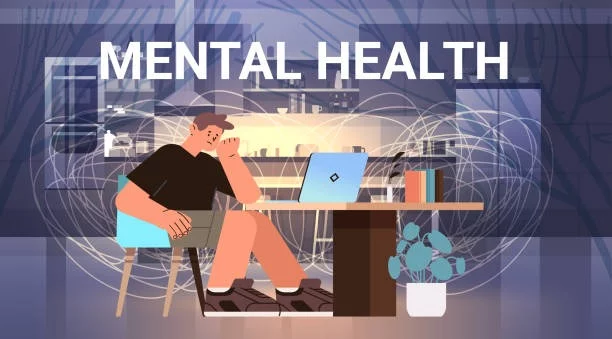In today’s fast-paced work environment, productivity depends on more than just managing your schedule or setting deadlines. It deeply connects with your mental and emotional health. It is estimated that more than one in five U.S. adults live with a mental illness (59.3 million in 2022; 23.1% of the U.S. adult population), highlighting just how widespread the need for accessible mental wellness strategies has become.
Regular mental health therapy supports your ability to handle stress, focus on priorities, and engage fully with your work. Instead of waiting for a crisis to strike, making therapy a routine part of your life creates a strong foundation for consistent daily productivity improvement. Integrating mental wellness strategies through therapy empowers you to perform at your best every day.
Unlocking Productivity Through Emotional Regulation
In Virginia, many professionals pursue consistent therapy sessions to strengthen emotional awareness and resilience in the workplace. Emotional regulation plays a central role in how effectively you navigate your workday. When faced with stressful situations or unexpected challenges, Mental Health Therapy in Virginia supports the recognition of emotional triggers and the development of strategies to respond with calm and control.
This skill reduces overwhelm and impulsive reactions, allowing for a more focused and composed approach to daily tasks. Incorporating emotional regulation into a mental health routine strengthens time management and decision-making, both essential for maintaining steady productivity.
As you build this foundation, you’ll notice that even demanding days feel more manageable, and your ability to stay on task improves significantly.
Enhancing Focus and Cognitive Function
Distractions are everywhere, and mental clutter can easily derail your best intentions. Therapy provides tools to identify unhelpful thought patterns and replace them with productive ones.
Through regular therapy sessions, you learn techniques such as mindfulness and cognitive behavioral strategies that sharpen your ability to stay present and engaged.
Breaking large projects into manageable steps and setting realistic goals becomes second nature when your mind is clearer and more organized. This enhanced focus not only improves your work output but also reduces the stress that comes from feeling overwhelmed by your responsibilities.
Strengthening Communication and Interpersonal Skills
Productivity often relies on how well you communicate and collaborate with others. Mental health therapy benefits include developing stronger interpersonal skills, which are essential for teamwork and leadership.
Therapy teaches you to express yourself assertively without aggression and to listen actively, fostering mutual understanding. It also equips you with strategies for constructively resolving conflicts, reducing workplace tension.
When communication flows smoothly, projects progress faster and workplace relationships become more supportive, creating an environment where everyone can contribute their best work.
Reducing Absenteeism and Presenteeism
Many people struggle with absenteeism—missing work due to health issues—or presenteeism, where they are physically present but mentally disengaged. Both situations negatively impact productivity and team dynamics.
Therapy for stress management addresses these issues by helping you recognize early signs of burnout and teaching practical coping mechanisms. This proactive approach supports your mental health before problems escalate and helps maintain consistent energy levels throughout your workweek.
By managing stress effectively, you are less likely to miss work and more likely to stay focused and motivated during your hours on the job.
Preventing Burnout and Enhancing Resilience
Burnout results from prolonged stress and emotional exhaustion, which can significantly diminish productivity and job satisfaction. A regular mental health routine supported by therapy helps you recognize the warning signs before burnout sets in.
Therapists guide you in developing resilience strategies, enabling you to bounce back from setbacks and handle ongoing challenges without feeling depleted. This includes learning to balance work demands with personal needs and adopting healthy boundaries. Over time, building resilience through therapy strengthens your ability to sustain effort, creativity, and enthusiasm in your professional life.
Aligning Personal Values with Professional Goals
At times, productivity stalls because your daily tasks don’t connect with your deeper motivations or values. Therapy for productivity often explores your personal goals and how they align with your professional path. When you gain clarity on what truly matters to you, it becomes easier to find meaning in your work and commit fully to your responsibilities.
This alignment boosts intrinsic motivation, making it easier to approach tasks with energy and intention. Therapy also supports you through career transitions or decision-making processes, helping you stay grounded in your values while pursuing professional growth.
Cultivating a Supportive Work Environment
Workplaces that value mental health create conditions where employees can thrive. Therapy plays a part in this culture by encouraging open communication about mental wellness and reducing stigma.
When mental health becomes a shared priority, managers and teams learn how to support each other effectively. This environment fosters empathy and understanding, which in turn improves collaboration and overall job satisfaction.
Organizations that integrate mental health and productivity create a virtuous cycle where employees feel valued, supported, and motivated to perform at their best.
Quantifying the Impact: Statistics and Case Studies
The positive effects of therapy on productivity are not just anecdotal—they are supported by research. Studies show that employees who receive mental health support report improved efficiency, creativity, and engagement at work.
Organizations with mental wellness programs experience reduced absenteeism and turnover rates, along with higher overall performance. These tangible outcomes underscore how mental health therapy benefits extend well beyond emotional support, directly influencing business success. Investing in therapy creates a healthier workforce capable of meeting today’s demands with resilience and focus.
Therapy vs No Therapy
| Aspect | With Regular Therapy | Without Therapy |
| Emotional Regulation | Effectively manages stress and emotions | Struggles with emotional overwhelm |
| Focus and Concentration | Improved sustained attention | Frequent distractions and mental fatigue |
| Communication Skills | Clear, assertive, and empathetic | Misunderstandings and poor collaboration |
| Absenteeism Rates | Lower due to proactive mental health care | Higher due to unmanaged stress |
| Burnout Levels | Lower through resilience and coping strategies | Higher due to chronic stress |
| Alignment with Goals | Clearer career focus and motivation | Lack of connection causing disengagement |
| Workplace Environment | Supportive and mentally healthy | Stressful and unsupportive |
| Overall Productivity | Consistently higher | Variable and often diminished |
FAQs
1. How quickly can I expect to see improvements in productivity after starting therapy?
Most individuals notice positive changes in focus, energy, and emotional management within a few weeks of consistent therapy sessions. The exact timeline varies depending on the person and their circumstances.
2. Is therapy only for people experiencing mental health crises?
Not at all. Therapy is valuable as a proactive mental wellness strategy. Many use it to build skills, enhance focus, and improve their overall quality of life before any significant problems arise.
3. Will my employer support my therapy attendance?
Increasingly, employers recognize the connection between mental health and productivity. Many provide support through flexible schedules or Employee Assistance Programs, making it easier to attend sessions without worry.
Conclusion
Regular mental health therapy serves as a powerful tool to boost your daily productivity by improving emotional regulation, focus, communication, and resilience. Therapy equips you with personalized strategies to manage stress, prevent burnout, and align your work with your values, fostering both professional success and personal fulfillment. By making therapy a routine part of your mental health care, you invest in sustained productivity and a healthier, more balanced work life.
Incorporating regular mental health therapy into your routine can significantly enhance your daily productivity by providing tools to manage stress and improve focus. Engaging with resources like the Friendly Recovery Center Mental health can offer additional support, helping individuals to navigate their mental health journey with professional guidance. This approach not only aids in personal growth but also fosters a more balanced and productive lifestyle. By addressing underlying issues and developing coping strategies, therapy empowers individuals to tackle daily challenges more effectively, leading to improved performance in both personal and professional spheres.

Lexy Summer is a talented writer with a deep passion for the art of language and storytelling. With a background in editing and content creation, Lexy has honed her skills in crafting clear, engaging, and grammatically flawless writing.



